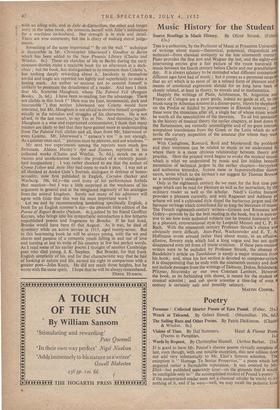Music History for the - Studen Source Readings in Music History.
By Oliver Strunk. (Fa 63s.) THIS is a collection, by the Professor of Music at Princeton Univers of writings about music—theoretical, polemical, rhapsodical technical—from classical antiquity to the late nineteenth cent Plato provides the first text and Wagner the last, and the eighty- intervening entries give a fair picture of the route traversed music between the fourth century before Christ and our grandfathe day. It is always salutary to be reminded what different concepti different ages have had of music ; but it comes as a perennial surp that an art which is to most of us a refined form of pleasure an means• of emotional expression should for so long have been closely related, at least in theory, to morals and to mathematics.
Happily the writings of Plato, Aristoxenus, St. Augustine Franco of Cologne are a poor guide, indeed no guide at all, to music sung by Athenian hetairai at a dinner-party, blown by shephe on the Pindus or fiddled by journeymen in Rhenish taverns ; these were the musicians after all, a single bar of whose music we be worth all the speculations of the theorists. To all but specialist in the history of musical theory the earlier chapters, at least down ti the Renaissance, are virtually unintelligible and of no great interest scrupulous translations from the Greek or the Latin which do no invite the cursory inspection of the amateur (for whom they wet never meant).
With Castiglione, Ronsard, Byrd and Monteverdi the problern$ and their treatment can be related to music as we understand ii where there is a more obvious relationship between theory and practice. Here the printed word begins to evoke the musical sound which is what we understand by music and lies hidden benear mountains of technical jargon in the earlier chapters—barypyka and authentus tetrardus, hypate mese or hypomixolydian diato saron, terms which to the layman's ear suggest Sir Thomas Brown or a seedsman's catalogue. Only in the eighteenth century do we meet for the first time pat sages which can be read for pleasure as well as for instruction, by the ordinary reader as well as the scholar. Niedt's Gothic humour provides a pleasant curiosity, and with Raguenet and Addison an urbane wit and a cultivated style dispel the barbarous jargon and the baroque verbiage which constituted for so long the literature of music The French eighteenth-century writers—Grimm and Rousseau 'all Grdtry—provide by far the best reading in the book, but it is instruc- tive to see how even technical subjects can be treated humanely and in a pleasant, conversational style by Leopold Mozart and C. P. E. Bach. With the nineteenth century Professor Strunk's choice was obviously more difficult. Jean-Paul, Wackenroder and E. T. A Hoffmann wrote around rather than about music, in an effusive allusive, flowery style which had a long vogue and has not quite disappeared even yet from all music criticism. If these para-musics writers were to be included by Professor Strunk, the absence a Baudelaire's article on Tannhiiuser is surely a major omission fror his book; and, since his last section is devoted to composer-critics it is disappointing that he ends with the nineteenth century and doe not include passages from the writings of Debussy, Dukas, Schonberg Pfitzner, Stravinsky or our own Constant Lambert. Howeve the book, as its forbidding title shows, is meant for the student musical scientist ; and sub specie scientlae a time-lag of even century is certainly safe and possibly salutary.
MARTIN COOPER.


























































 Previous page
Previous page